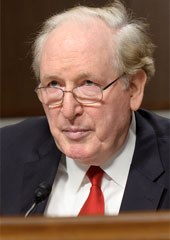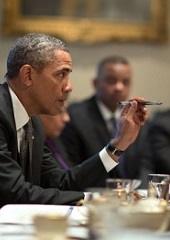Mr. Obama, Stop the Privatization of U.S. Intelligence!
Why the U.S. Congress must not turn a fundamental government responsibility over to the private sector.
January 30, 2014

Editor’s note: This article is adapted from U.S. Senator Jay Rockefeller’s statement to the Senate Select Intelligence Committee Hearing on Current and Projected National Security Threats Against the United States, on January 29, 2014. For the full statement, click here.
The President announced that Section 215 telephony metadata should no longer be stored by the government, and he asked the Director of National Intelligence to work with the Attorney General to come up with alternate options.
The collection and querying of this metadata is not a private sector responsibility. It is fundamentally a government function.
Practically, the private sector does do not have the technical capacity to do so. And certainly, it is impossible to do so without the possibility of massive mistakes or catastrophic privacy violations.
There are hundreds and hundreds of telecommunications companies in the United States. They do not want to become agents of the government. They do not want to become the government’s guardians of vast amounts of intelligence data.
The telecom providers themselves do not want to do this, and for good reason. They are businesses, and they are focused on rewarding their shareholders, not protecting privacy or national security.
My concerns about private providers retaining this data for national security purposes are only heightened by the advent of the multi-billion dollar data broker industry. It mines troves of data — including telephone numbers — which it uses to determine our most personal inclinations. One data broker holds as much as 75,000 different data points about each of us including our health and financial status. That is staggering.
Further involving the telecom providers in the extended storage of this data for intelligence purposes would not only make that data subject to discovery in civil lawsuits. It would also make it more vulnerable to theft by hackers or foreign intelligence organizations. Another powerful reason to be against private companies taking responsibility for an inherently governmental function.
Additionally, Target’s recent loss of 110 million American consumers’ personal information to hackers does not reassure me that moving this sensitive data to the private sector for intelligence purposes would adequately protect consumers’ privacy.
Moving this data away from the stringent audits and oversight mechanisms that are in place makes the data more, not less, vulnerable to abuse. I want to reiterate, the telecom providers want no part of it. This is not a foundation for a good partnership.
In fact, for context, under the existing system there are only 22 supervisors and 35 intelligence analysts who work specifically in the Intelligence Directorate. They work in an extremely controlled environment with anonymized data.
Their queries are subject to multiple overlapping checks, audits and inspections. Keep in mind these queries involve only anonymous numbers — no name, no content and no location. Unlike many private companies, no one is listening to your private conversation or reading your email.
The data is highly secure, and the queries of that data are conducted only by highly trained professionals.
Making the telecom providers keep the metadata for intelligence purposes, where it will need to be searched, will introduce a whole new range of dangerous privacy and security concerns. I think going down this path will threaten, not strengthen, our ability to protect this country and the American people from terrorist attack and massive invasions of their privacy.
Takeaways
There are hundreds and hundreds of telecommunications companies in the United States.
Telecommunications companies in the U.S. do not want to become agents of the government.
Congress cannot tolerate private companies taking responsibility for an inherently governmental function.
Target's recent loss of consumers' data does not reassure anyone about the protection of Americans' privacy.
The telecom providers want no part of overseeing this data. This is not a foundation for a good partnership.
Author
The Globalist
Read previous

Yes We Can: The NSA and Obama
January 29, 2014